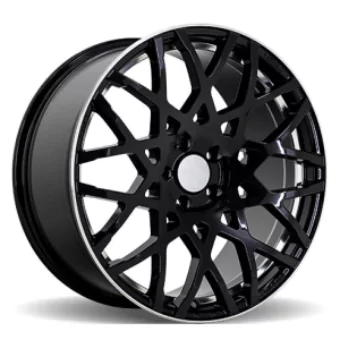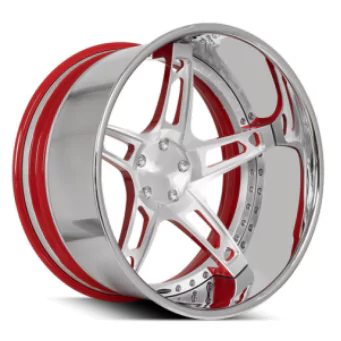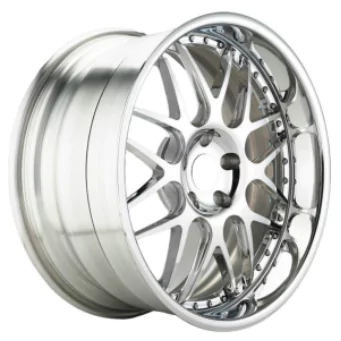Overview
Alloy wheels are a popular choice for many car enthusiasts and everyday drivers alike due to their aesthetic appeal and performance benefits. They are made from an alloy of aluminum or magnesium. Their design is optimized using advanced techniques to ensure they meet both functional and aesthetic requirements. These wheels offer numerous benefits including reduced weight, improved heat dissipation, and enhanced visual appeal compared to traditional steel wheels.
Manufacturing Process The manufacturing process of alloy wheels typically involves casting or forging. Both methods aim to achieve a balance of strength, weight, and aesthetic appeal. Advanced techniques and quality control measures are employed to ensure the wheels meet industry standards.
Advantages of Alloy Wheels Over Steel
Enhanced Aesthetic Appeal
One of the hallmarks of alloy wheels is their visual appeal. The design flexibility of alloy wheels allows for complex and stylish patterns that can significantly enhance the appearance of any vehicle. Unlike steel wheels, which are usually basically practical, alloy wheels are available in a variety of finishes including polishing, painting and machining to provide a customized and sophisticated look.
Improved Performance and Handling
Alloy wheels contribute to better vehicle performance and handling. The lightweight of alloy wheels reduces the unsprung mass and directly affects the working efficiency of the suspension system. This reduction results in improved cornering and steering response, providing a smoother and more controlled driving experience. In addition, alloy wheels provide better braking performance and improve overall vehicle safety.
Weight Reduction and Fuel Efficiency
Compared with steel wheels, the weight reduction of alloy wheels plays an important role in improving fuel efficiency. Reducing the total weight of the vehicle reduces the workload of the engine and thus reduces fuel consumption. This weight reduction also helps to reduce wear on suspension components, further extending the service life of the vehicle.
Improved Heat Dissipation
One of the main advantages of alloy wheels compared to steel wheels is their superior heat dissipation. This enhanced heat dissipation capability is particularly beneficial in high-performance driving scenarios, as it helps prevent brakes from overheating, thereby minimizing the risk of brake failure. This feature ensures that the braking system remains reliable and efficient even in demanding driving conditions.
Cost Considerations
Initial Investment vs. Long-term Benefits
While the upfront cost of alloy wheels may be higher compared to steel wheels, the long-term benefits often outweigh the initial investment. The durability, enhanced performance, and aesthetic advantages can lead to cost savings over time. Additionally, the improved fuel efficiency contributes to lowering overall vehicle operating costs, providing a more economical driving experience in the long run.
Maintenance and Durability
Alloy wheels require regular maintenance to maintain their appearance and performance. Unlike steel wheels, which can rust easily, alloy wheels are resistant to corrosion and, with proper care, can maintain their pristine look for years. Regular cleaning and occasional protective coatings can prolong their lifespan. Although they are prone to bending or cracking under extreme conditions, advances in manufacturing have significantly enhanced their durability.
Impact on Vehicle Value
Resale Value Enhancement
Equipping a vehicle with alloy wheels can positively impact its resale value. Potential buyers often perceive vehicles with alloy wheels as being better maintained and more aesthetically pleasing. This perception can translate into a higher resale price, making alloy wheels a worthwhile investment for those considering selling their vehicle in the future.
Market Demand for Alloy Wheels
The demand for alloy wheels in the market continues to grow as more consumers recognize their benefits. Manufacturers and car enthusiasts alike favor alloy wheels for their design flexibility, performance enhancements, and aesthetic appeal. This growing demand ensures that alloy wheels remain a sought-after feature, further solidifying their value in the automotive market.
Safety and Reliability Aspects
Structural Strength and Integrity
Alloy wheels are engineered with a focus on structural strength and integrity. Made from a mix of metals like aluminum and magnesium, these wheels boast a robust construction that can withstand various driving conditions. The use of lightweight but strong materials ensures that alloy wheels maintain their shape and alignment, reducing the risk of deformations under stress. This structural resilience is particularly beneficial during high-speed driving or when navigating rough terrains, where the wheels must endure significant forces without compromising safety.
Resistance to Corrosion
Another vital aspect of alloy wheels concerning safety and reliability is their ability to resist corrosion. In contrast to steel wheels, which are susceptible to rust and the resulting structural weakness, alloy wheels inherently resist corrosion due to the characteristics of aluminum and magnesium. This resistance is further bolstered by protective coatings applied during manufacturing. With regular upkeep, alloy wheels can maintain their strength and appearance over many years, providing dependable performance without the worry of damage from rust.
Making the Right Choice for Your Vehicle
Compatibility and Sizing
Selecting the right alloy wheels for your vehicle involves careful consideration of compatibility and sizing. It’s essential to ensure that the wheels are the correct size, as improper sizing can lead to issues with handling, ride quality, and overall vehicle performance. Factors such as the bolt pattern, offset, and diameter must be compatible with your vehicle’s specifications. Consulting with a knowledgeable retailer or using online fitment tools can help in identifying alloy wheels that perfectly match your car’s requirements, guaranteeing optimal function and safety.
Brand Reputation and Quality Assurance
Investing in alloy wheels from reputable brands ensures that you receive a product that meets stringent quality and safety standards. Renowned manufacturers typically adhere to rigorous testing and quality control measures, offering wheels that are not only stylish but also reliable and durable. Brand reputation is often built on years of delivering high-quality products, and choosing wheels from such manufacturers can save you from potential headaches and additional costs in the future.
Quality assurance is another critical factor, as it involves thorough testing for strength, durability, and performance. Reputable brands often provide warranties and after-sales support, adding an extra layer of security to your investment. Whether you are purchasing wheels for aesthetic enhancement or performance improvement, prioritizing brand reputation and quality assurance is key to making a wise, long-term investment in alloy wheels.
Vesteon Automotive Parts (Group) Co., Ltd is a renowned wheel manufacturer based in Shandong province, China. The company’s sprawling facility spans over 100,000 square meters and employs more than 700 staff. With an annual production capacity of 3 million pieces, it is a significant player in this industry.
The alloy wheels of Vesteon standout, which combines the strength of steel with the lightweight properties of aluminum. This blend not only enhances the performance of your vehicle but also adds a touch of elegance and style. From VT001 to VT128, you can choose from over 100 models of products.
Vesteon is not just a wheel manufacturer; it’s a partner that adds value to your vehicle and driving experience.
Final Thoughts on Investing in Alloy Wheels
Investing in alloy wheels is a decision that carries various benefits, ranging from enhanced aesthetic appeal and improved performance to long-term cost savings and increased vehicle value. Despite the higher initial investment compared to steel wheels, the numerous advantages make them a smart and worthwhile choice for many vehicle owners. With careful consideration of factors such as structural strength, resistance to corrosion, compatibility, and brand reputation, you can select alloy wheels that will not only elevate your driving experience but also ensure safety and reliability on the road.



